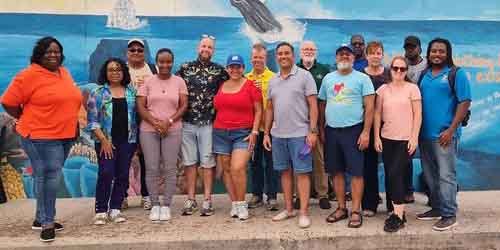On Sunday, members of the Dutch Caribbean Agriculture Livestock and Fisheries Alliance (DCALFA) visited Saba to learn more about the various projects and initiatives in these sectors that contribute to local food production and help stimulate the local economy. In June 2023, all 6 Dutch Caribbean islands signed a memorandum of understanding to promote cooperation amongst the islands in the agriculture, livestock and fisheries sectors as a step toward ensuring food security. An aim of the MoU is for the islands to share information, (local) knowledge, know-how, and best practices, so that each island can also benefit from the other’s successes and lessons learned.

The trip to Saba came as part of the program of the DCALFA conference taking place in St. Eustatius this week. The delegation consisted of policy advisors, department heads, and other stakeholders who work in agriculture, fisheries, and livestock on the islands of St. Eustatius, Aruba, and Bonaire. St. Eustatius Commissioner Arlene Spanner-Schmidt – whose portfolio includes agriculture, nature, and fisheries – and Aruba Minister Ursell Arends – whose portfolio includes transport, integrity, nature, and elderly affairs – were also in attendance.
The delegation visited some of the government projects and private initiatives while on the island. Their first stop was to the Saba Reach Foundation garden in the Level, where they were given a tour and explanation about the farm by garden manager Maarten Plante. He explained that the primary purpose of the garden is for the Saba Reach clients. The production of fruits and vegetables is an outcome of the skills and knowledge their clients acquire as part of the foundation’s development program. These fruits and vegetables are sold at the Wednesday market in Windwardside and at the recently opened Saba Greens at the Saba Artisanal Center in The Bottom.
From the Saba Reach garden, the delegation visited the farm of Justin Simmons-de Jong and his father Lloyd Simmons. Here they were given a tour of their fruit tree garden and the chicken and goat farm. Simmons explained that through investments of various grafts of avocado trees, he is able to harvest avocados throughout the greater part of the year. The avocados are used for personal consumption with some being sold. The poultry farm consists of over 200 chickens that are kept for their eggs, which are sold locally. The goats that Simmons-de Jong and his father keep are Boer goats, which are used as breeding stock. The offspring are sold to other goat farmers on the island and on neighboring islands.
The delegation also visited the Public Entity Saba’s hydroponics farm project and was given a tour of the facility by NEPP program manager Sarah van der Horn. Here, delegation members got to see the leafy greens and vine crops that are being grown. It was explained to the delegation that due to climate change, Saba will experience less rainfall and more extreme droughts. It is, therefore, necessary to cultivate crops in ways that use water conservatively and efficiently to prepare for the future. In the same area, the delegation visited the PES’s meat-processing facility and were given a demonstration of how goat carcasses are processed by government hunter and butcher, Matthew Barnes.
GIS
The tour ended with a presentation given to the delegation by local fisherman Ryan Hassell, who talked about what it means to be a commercial fisherman on Saba. In his presentation, Hassell explained that his main focus is on lobster and snapper and explained the methods he uses to harvest, safely transport
and sell his catch, both on island and in St. Maarten. He also spoke about the challenges the Saba fishermen face and how they overcome them with sometimes very practical solutions. An example of this is the agreement amongst the local fisherman to refrain from fishing for snapper during this particular species’ spawning season to help ensure population numbers are kept healthy.
 Saba News News and Information from Saba Island, Dutch Caribbean
Saba News News and Information from Saba Island, Dutch Caribbean

This article makes it sound like we have plenty of fresh fruit, vegetables, eggs, fish and goat meat. However, it’s only available in Windwardside on Wednesdays and you have to get up very early to get to the vegetable/fruit market and the fish truck (when it shows up) before everything sells out. The local Windwardside supermarkets also receive their shipments on Wednesdays (usually) and sell out quickly. I worry about our food supply in the case of multiple hurricanes. How can we get more food grown on Saba and more food delivered to Saba?
I am not certain how long you have been on Saba, however Saba has experience multiple back to back hurricanes in the past and we have always manage food supply adequately. There are times indeed when certain supplies becomes unavailable for a while, but the agricultural ecosystem always produces something else to make up for these shortages.
I am trying to reduce your level of worry by telling you that the island has made great strides with agricultural production and continues to improve to deal with situations like what you worry about. With more hands getting involve in backyard, small space, verandah and porch gardening, I think we are taking the correct steps to deal with issues like what you say.